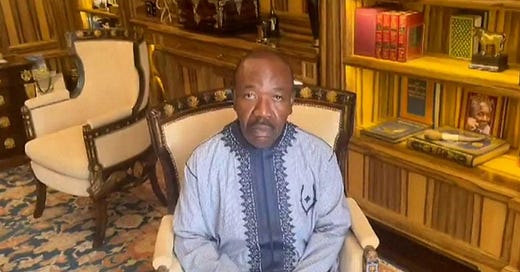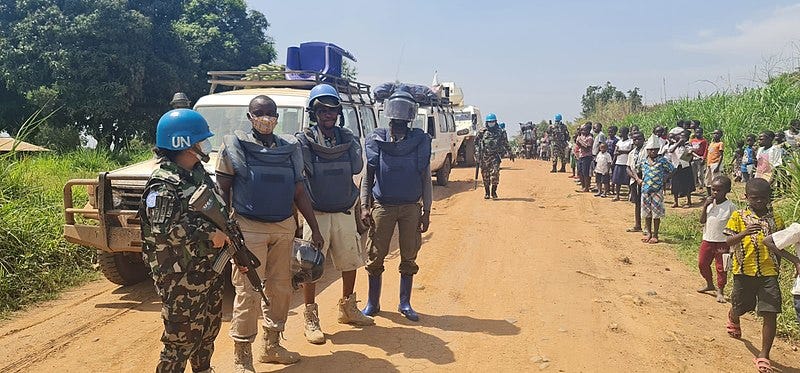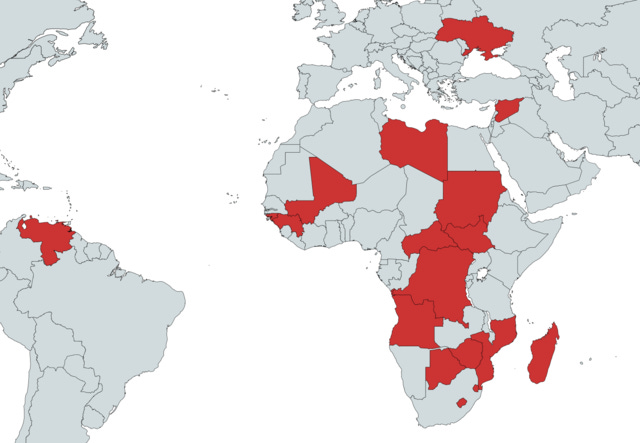🔅 Who's Gabon's New Leader? & South Africa's Tragic Blaze
Plus, Congo's Protests Against UN Peacekeepers & Nigeria's Plan To Fix Its Finances
Photo of the day: Abidjan, Côte d’Ivoire
Markets:
🟢 Nigerian SE: 66,548.99 (+0.16%)
🔴 Johannesburg SE: 75,256.19 (-0.48%)
🔴 Ghana SE: 3,099.49 (-0.43%)
🔴 Nairobi SE: 99.50 (-0.15%)
🟢 US S&P 500: 4,522.66 (+0.17%)
🔴 Shanghai Composite: 3,119.88 (-0.55%)
*Data accurate as of the close of markets across the continent
Brief & Bright: Africa's Top Five
Who is the New Ruler of Gabon?
After a coup by army officers in Gabon the day before yesterday, General Brice Oligui Nguema was carried through the streets of the capital, Libreville, in a triumphant display. The former French colony’s 55-year hold on power by the Bongo family has come to an end, with General Nguema appointed the new transitional leader by a unanimous vote of the officers. General Nguema was an aide-de-camp to the ousted leader's father, Omar Bongo, and had been extremely close to him until his death in 2009, when his son succeeded him. But General Nguema has also had his own share of the spotlight—he worked as a military attache in Morocco and Senegal, and then was made intelligence chief under the elite republican guard before getting promoted to general. Some reports implicate him in the corruption that has mired the country oThere has been simmering discontent in Gabon for a while now, especially over the cost of living, and the coup was met with celebration by many. The international community, however, condemned the move and urged the military to restore civilian rule. Meanwhile, ex-president Bongo appeared in a video, pleading for his “friends all over the world” to “make noise” on his behalf. The power is in General Nguema’s hands now, so the question remains—what will he do with it?
South Africa's Tragic Blaze: 73 Dead, Many More Trapped

South Africa’s biggest city is mourning the loss of 73 people who perished in a devastating fire that ripped through a five-story building filled with homeless people and squatters. As many as 200 people may have been living in the building, and dozens of bodies were lined up on a nearby side road. Emergency crews expected to find more victims as they worked their way through the building, which was effectively “an informal settlement” in which shacks and other structures had been thrown up and people were crammed into rooms. People were heard screaming for help and shouting, “We’re dying in here” as the blaze broke out, and some threw themselves out of windows. Firefighters had only worked their way through three of the building’s five floors by mid-morning, and the chance of anyone being found alive hours after the fire broke out was “very slim.” The cause of the blaze is being investigated.
Congolese Protestors Take on UN Peacekeepers
The United Nations MONUSCO mission has been facing protests in the Democratic Republic of Congo for the last few years, and this week, things got more intense. Organisers had called for a peaceful demonstration, but it did not go according to plan. Images circulating on social media showed people in civilian clothes armed with sticks and stones beating a policeman tied up on the ground. The Congolese army said in a statement that six protesters had been killed in the ensuing violence and 158 were arrested. A UN source said the death toll was at least eight, including two soldiers and a policeman. The protests are a result of the Congolese people’s dissatisfaction with the UN’s failure to protect civilians against years of militia violence and a humanitarian crisis that’s been fuelled by rebel conflict and recurrent natural disasters.
The Aftermath of Prigozhin's Plane Crash: How It Affects Wagner's Presence in Africa
Just one day before his plane crashed and he was killed, Yevgeny Prigozhin—the leader of the Wagner Group—released a recruitment video from a desert-like landscape, boasting about how his mercenaries had brought justice and happiness to Africa. It’s debatable if that’s true or not, but one thing’s for sure—the Wagner Group has been a major presence on the continent for five years now, propping up regimes and providing Moscow with influence at little cost. Its presence has been felt in Sudan, Lybia, and in some places like Mali and Central African Republic, Prigozhin has gained quasi-celebrity status. Even though he is now confirmed dead, his presence in Africa will be felt for years to come: The Kremlin will want to maintain the lucrative contracts Wagner had set up, including gold mining, oil services, and customs contracts. And Wagner's operatives had formed close ties with government and military officials, which Russia appreciates as an opportunity to counter Western influence in the region. Why would the Kremlin want to give that up?
Nigeria's Plan to Fix Its Finances: Step 1—Don't Borrow

Nigeria’s new government has an ambitious plan to fix the country’s finances—and it starts with a simple, yet hard-to-follow step: Don’t borrow. Finance Minister Olawale Edun said the government won’t rely on loans to create jobs, but instead will focus on creating a stable environment to attract local and foreign investments. It’s a bold move, especially considering the economic damage from previously low oil prices and the pandemic, as well as reforms including scrapping a popular but costly petrol subsidy and removing exchange rate restrictions, which have weakened the Naira to record lows. But Edun is confident that this plan will work, since the government’s naira revenues have increased from crude oil proceeds following a devaluation in June. “Clearly, that is repairing the finances of government,” he said.
Food for Thought
“A quarrelsome chief does not hold a village together.”
— Malawian Proverb.
Are we hitting the mark?
Enjoying Baobab's updates? Spread the joy and share us with friends and colleagues — we'd be thrilled to have them join!
Feedback or thoughts? Just hit reply. We're all ears!







